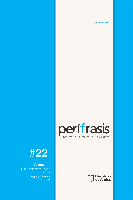
Perifrasis-Revista de Literatura Teoria y Critica
Scope & Guideline
Fostering innovative discourse in the humanities.
Introduction
Aims and Scopes
- Interdisciplinary Approaches to Literature:
The journal encourages submissions that integrate various fields, including philosophy, cultural studies, and ecocriticism, emphasizing how these disciplines inform and enrich literary analysis. - Focus on Marginalized Voices:
There is a consistent commitment to exploring literature from historically marginalized groups, including women, Afro-Colombian voices, and indigenous perspectives, thereby broadening the scope of literary criticism. - Exploration of Contemporary Issues:
Papers often address contemporary social issues such as migration, biopolitics, and environmental crises, reflecting the journal's engagement with current global challenges through a literary lens. - Historical Contextualization:
The journal frequently situates literary works within their historical contexts, examining how past events shape narratives and cultural identities in Latin America. - Theoretical Innovations:
A significant aim is to explore and develop new theoretical frameworks for understanding literature, including concepts like necropolitics, transculturality, and critical ecocriticism.
Trending and Emerging
- Decolonial and Postcolonial Perspectives:
There is an increasing focus on decolonial and postcolonial critiques, examining how literature reflects and contests colonial histories and their ongoing impacts on identity and culture. - Ecocriticism and Environmental Literature:
Emerging themes in ecocriticism highlight the intersection of literature and environmental concerns, exploring how narratives shape our understanding of ecological issues and human relationships with nature. - Migration and Transnationalism:
The exploration of migration narratives and transnational identities is gaining traction, reflecting the contemporary realities of displacement and the complexities of cultural exchange. - Gender Studies and Queer Theory:
There is a noticeable uptick in works addressing gender dynamics and queer identities, emphasizing the importance of these themes in understanding literary texts and cultural production. - Digital Humanities and Literature:
Emerging discussions around the impact of digital technologies on literature, including the analysis of digital narratives and the role of social media in literary discourse, are becoming increasingly relevant.
Declining or Waning
- Traditional Literary Canon:
There is a noticeable decline in papers focused on traditional literary canon works, such as those primarily analyzing Western classics, as the journal increasingly prioritizes underrepresented voices and contemporary issues. - Purely Historical Studies:
The focus on purely historical literary studies seems to be waning, with fewer submissions dedicated solely to historical analysis without connecting to contemporary themes or socio-political contexts. - Biographical Criticism:
Papers centered on biographical criticism of authors, which were once prevalent, are becoming less common, as the journal moves towards more thematic and theoretical explorations. - Formalism and Structuralism:
There has been a reduction in works that strictly adhere to formalist or structuralist methodologies, indicating a shift towards more holistic and context-driven approaches to literary analysis. - Literary Reviews and Summaries:
The journal appears to be moving away from publishing straightforward literary reviews or summaries, focusing instead on critical essays that provide deeper theoretical insights and original contributions.
Similar Journals

Valenciana
Illuminating contemporary issues through innovative research.Valenciana is an esteemed, peer-reviewed journal published by the University of Guanajuato, dedicated to advancing scholarly discourse in the fields of humanities and social sciences. Since its inception in 2008, this Open Access journal has facilitated unrestricted access to high-quality research, fostering collaboration and innovation among researchers, professionals, and students. With an ISSN of 2007-2538 and an E-ISSN of 2448-7295, Valenciana is committed to publishing original research, reviews, and theoretical contributions that illuminate contemporary issues and cultural phenomena. The journal not only serves as a platform for emerging voices in academia but also enhances its visibility in the global research landscape, driving interdisciplinary dialogue and engagement. Situated in Guanajuato, Mexico, Valenciana embraces the rich academic heritage of the region while also appealing to a broader audience, making it a vital resource for those seeking to explore new ideas and perspectives in their respective fields.
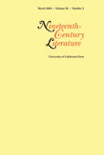
NINETEENTH-CENTURY LITERATURE
Innovating Discourse in the Realm of 19th-Century LiteratureNineteenth-Century Literature, published by University of California Press, stands as a vital resource for scholars and enthusiasts of literature and literary theory. With an ISSN of 0891-9356, this esteemed journal explores the multifaceted dimensions of 19th-century literary works, offering critical analyses and innovative perspectives that advance the discourse in this pivotal era of literature. It holds an impressive ranking of Q3 in the Literature and Literary Theory category, with a Scopus rank of #417 out of 1106, placing it in the 62nd percentile globally. The journal, which has been disseminating knowledge since 1986 and will continue through 2024, is committed to publishing high-quality research that challenges conventional interpretations and engages with contemporary literary debates. Although it currently does not offer open access, its comprehensive scope and rigorous scholarship make it an essential platform for academics aiming to deepen their understanding of 19th-century literature.
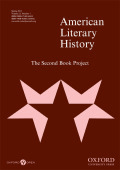
AMERICAN LITERARY HISTORY
Navigating the Rich Landscape of American Literary StudiesAMERICAN LITERARY HISTORY, published by Oxford University Press Inc, is a leading peer-reviewed journal dedicated to advancing the understanding of American literature within the broader contexts of cultural studies and history. With an impressive impact factor reflecting its Q1 ranking in Cultural Studies, History, and Literature and Literary Theory, this journal serves as an essential resource for researchers, professionals, and students alike. Covering a wide range of topics, it seeks to illuminate the historical and cultural dynamics that shape literary production in the United States from 1989 to 2024. Although not an open access journal, AMERICAN LITERARY HISTORY remains a pivotal platform for scholarly discourse, encouraging rigorous scholarship and critical engagement with literary texts. The journal's strong Scopus rankings further emphasize its significance, ranked among the top journals in its field, making it an indispensable tool for anyone seeking to explore the rich tapestry of American literary heritage.

CUADERNOS HISPANOAMERICANOS
Illuminating the Rich Tapestry of Latin American StudiesCUADERNOS HISPANOAMERICANOS, published by the Agencia Española Cooperación Internacional para el Desarrollo (AECID), serves as a vital platform for scholars and practitioners within the fields of Arts and Humanities as well as Social Sciences, particularly focusing on cultural studies pertaining to the Hispanic world. With a rich history since its inception in 1971, the journal has curated a wealth of knowledge, although its coverage in prominent databases like Scopus was discontinued after 2019. Ranked in the 23rd percentile in Arts and Humanities and the 17th percentile in Cultural Studies, CUADERNOS HISPANOAMERICANOS continues to stimulate discourse among researchers by offering critical insights into the socio-cultural dynamics of Latin America. The journal is not Open Access, which maintains a level of selectivity regarding its readership. By prioritizing high-quality and impactful research, CUADERNOS HISPANOAMERICANOS plays an essential role in the ongoing scholarly dialogue and development of knowledge related to Hispanic studies.

MELUS
Engaging with the Complexities of Cultural NarrativesMELUS (Modern English Language and Literature Studies), published by Oxford University Press Inc, is a leading academic journal dedicated to exploring the complexities and dynamics of American literature and culture from various critical perspectives. With a strong historical foundation since its inception in 1974, MELUS is recognized for its contributions to both Cultural Studies and Literature and Literary Theory, achieving notable rankings in the Q2 and Q3 quartiles respectively as of 2023. The journal's articles are essential for scholars and practitioners seeking to engage with contemporary literary discourse, featuring innovative research that challenges conventional understandings of cultural identity and representation. Although it does not offer Open Access options, MELUS remains a crucial resource for academic libraries and research institutions in the United States and beyond, providing access to cutting-edge scholarship that informs the study of literature in a global context. For those invested in the field, MELUS serves as an invaluable platform for disseminating transformative ideas and fostering discussions that shape the future of literary studies.
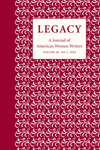
LEGACY
Advancing Scholarship at the Crossroads of Culture and IdentityLEGACY is a prominent journal published by University of Nebraska Press, dedicated to exploring the multifaceted relationships between literature, culture, and gender studies. With an ISSN of 0748-4321, this journal has established itself as a platform for critical discourse since its inception in 2002. As a Q4 ranked publication in both Gender Studies and Literature and Literary Theory, LEGACY engages with diverse perspectives and timely topics, providing a unique opportunity for scholars to contribute to ongoing debates in these fields. Although it does not operate under an open access model, its content remains essential for researchers, professionals, and students seeking to expand their knowledge and understanding of complex literary and gender issues. With a commitment to enriching the academic landscape, LEGACY aims to foster dialogue and inspire future scholarship through its thoughtful articles and critical analyses.
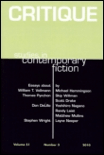
CRITIQUE-STUDIES IN CONTEMPORARY FICTION
Exploring the Depths of Contemporary NarrativesCRITIQUE: STUDIES IN CONTEMPORARY FICTION is a premier scholarly journal published by Routledge Journals, Taylor & Francis Ltd, dedicated to advancing our understanding of contemporary fiction within the broader spectrum of literature and literary theory. With an esteemed reputation in the academic community, this journal has achieved a remarkable impact factor and ranks in the Q1 category in Literature and Literary Theory, showcasing its influence and credibility, as reflected in its Scopus Rank of #142 out of 1,106 and a notable 87th percentile. The journal invites researchers, scholars, and students to engage with innovative perspectives, critical analysis, and interdisciplinary exploration of contemporary narratives. Published continuously since 1956, CRITIQUE serves as a vital resource for those seeking to understand the complexities of modern literature, and it remains committed to fostering dialogue around diverse textual and cultural contexts.
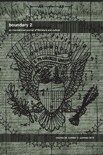
BOUNDARY 2-AN INTERNATIONAL JOURNAL OF LITERATURE AND CULTURE
Challenging Conventional Paradigms in ScholarshipBOUNDARY 2: An International Journal of Literature and Culture, published by Duke University Press, stands as a pivotal platform for interdisciplinary discourse at the intersection of literature, culture, history, and the social sciences. With an ISSN of 0190-3659 and an E-ISSN of 1527-2141, this journal uniquely addresses the complexities of cultural narratives and theoretical frameworks from 2002 to the present. Although it is not an open-access publication, its rigorous scholarship and critical insights have positioned it within esteemed quartiles: Q3 in Cultural Studies, Q2 in History and Literature and Literary Theory, and Q4 in Sociology and Political Science for 2023. As the academic landscape evolves, BOUNDARY 2 continues to challenge conventional paradigms, making it an essential resource for researchers, professionals, and students eager to explore contemporary issues in literature and culture.

CAMBRIDGE QUARTERLY
Fostering Innovative Research in Literary StudiesCAMBRIDGE QUARTERLY, published by Oxford University Press, stands as a dedicated outlet for scholarly discourse in the realm of Literature and Literary Theory. Since its inception in 1965, this journal has fostered a rich landscape for academic inquiry and discussion, with a commitment to exploring the intricate dynamics of literary studies up to 2024 and beyond. With an ISSN of 0008-199X and an E-ISSN of 1471-6836, CAMBRIDGE QUARTERLY offers a platform for innovative research, although it currently does not provide open access options. The journal is noted for its scholarly contributions, ranking in the Q4 quartile within its category based on the 2023 metrics, and holds the 635th rank in Scopus for Arts and Humanities specifically focused on Literature and Literary Theory, placing it in the 42nd percentile. As such, it appeals to researchers, professionals, and students alike, seeking to deepen their understanding of literary discourse and theoretical frameworks.

Estudios de Teoria Literaria-Revista Digital-Artes Letras Humanidades
Unveiling Complex Theoretical FrameworksEstudios de Teoria Literaria-Revista Digital-Artes Letras Humanidades is a prominent scholarly journal published by UNIV NAC MAR PLATA in Argentina, dedicated to advancing the fields of Literary Theory, Communication, and Cultural Studies. Established with an Open Access model since 2012, the journal fosters global dissemination of research without financial barriers, encouraging a broader dialogue among scholars, practitioners, and students alike. Notably, it enjoys a presence in Scopus, with various category quartiles indicating its commitment to quality and relevance, particularly with rankings such as Q3 in Literature and Literary Theory. By providing a platform for innovative scholarship, Estudios de Teoria Literaria aims to explore complex theoretical frameworks and cultural discourses, making significant contributions to ongoing debates in the humanities. The journal is published from its base in Mar del Plata, Buenos Aires, and continues to expand its influence in both regional and international academic communities.